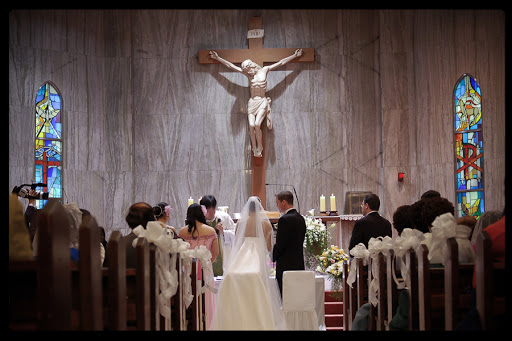The semi-official newspaper of the Holy See L’Osservatore Romano published an article today by Archbishop Müller, prefect of the Congregation for the Doctrine of Faith, reaffirming the Church’s teaching that divorced and remarried Catholics cannot receive communion.
“The problem concerning members of the faithful who have entered into a new civil union after a divorce is not new,” Müller begins the article, entitled "The Power of Grace." “The Church has always taken this question very seriously and with a view to helping the people who find themselves in this situation.”
He acknowledges, though, that the Church’s long-time stance on the matter has come under question recently. “Today even firm believers are seriously wondering: can the Church not admit the divorced and remarried to the sacraments under certain conditions? Are her hands permanently tied on this matter? Have theologians really explored all the implications and consequences?”
Here are the thirteen most important quotes from his defense of the Church’s position that divorced and remarried Catholic cannot be admitted to communion without receiving the Sacrament of Reconciliation and agreeing to at least live in continence with their new partner:
1) What are the sources to consider for answering this question? They are Scripture and Tradition as interpreted by the Magisterium.
2) In Scripture, Jesus teaches that marriage is indissoluble, pointing to God’s original plan in creation.
3) The early Church fathers understood Jesus’ teaching on the indissolubility of marriage as binding and rejected divorce laws.
4) The Catholic Church has always defended the Scriptural and Traditional teaching that divorce and remarriage is impossible. The teaching was upheld at both the Council of Trent and the Second Vatican Council.
"The Second Vatican Council, in the Pastoral Constitution Gaudium et Spes on “The Church in the Modern World”, presents a theologically and spiritually profound doctrine of marriage. It upholds the indissolubility of marriage clearly and distinctly.”
5) Marriage finds its full meaning only in Christ.
6) The Church’s teaching regarding marriage and reception of the Eucharist has been reaffirmed several times in recent years since the Second Vatican Council.
“The Congregation for the Doctrine of the Faith’s statement of 14 September 1994 on reception of holy communion by divorced and remarried members of the faithful emphasizes that the Church’s practice in this question “cannot be modified because of different situations” (no. 5). It also makes clear that the faithful concerned may not present themselves for holy communion on the basis of their own conscience: “Should they judge it possible to do so, pastors and confessors … have the serious duty to admonish them that such a judgment of conscience openly contradicts the Church’s teaching” (no. 6). […]
“In the Post-Synodal Apostolic Exhortation Sacramentum Caritatis of 22 February 2007, Benedict XVI summarizes the work of the Synod of Bishops on the theme of the Eucharist and he develops it further. In No. 29 he addresses the situation of divorced and remarried faithful. For Benedict XVI too, this is a “complex and troubling pastoral problem”. He confirms “the Church’s practice, based on Sacred Scripture (cf. Mk 10:2- 12), of not admitting the divorced and remarried to the sacraments”, but he urges pastors at the same time, to devote “special concern” to those affected: in the wish that they “live as fully as possible the Christian life through regular participation at Mass, albeit without receiving communion, listening to the word of God, eucharistic adoration, prayer, participation in the life of the community, honest dialogue with a priest or spiritual director, dedication to the life of charity, works of penance, and commitment to the education of their children”.”
7) Due to our culture’s distortion of marriage, it’s likely that many more marriages today are invalid than in past times.
8) If a Catholic whose first marriage was valid has since married a second time, in order to receive the Eucharist they must receive the Sacrament of Reconciliation and agree to live in continence with their new partner.
9) The indissolubility of marriage is important for the good of the spouses and their children.
10) The world cannot understand Christian marriage, but the Church must hold fast to God’s plan.
“The Gospel of the sanctity of marriage is to be proclaimed with prophetic candour. By adapting to the spirit of the age, a weary prophet seeks his own salvation but not the salvation of the world in Jesus Christ. Faithfulness to marital consent is a prophetic sign of the salvation that God bestows upon the world.”
11) There are situations when it’s best for spouses to separate. But they remain married and should be supported by the Church in their difficult situation.
12) Appeals to God’s mercy in order to allow divorced and remarried Catholics to receive communion distort the meaning of God’s mercy.
“The mystery of God includes not only his mercy but also his holiness and his justice. If one were to suppress these characteristics of God and refuse to take sin seriously, ultimately it would not even be possible to bring God’s mercy to man. Jesus encountered the adulteress with great compassion, but he said to her “Go and do not sin again” (Jn 8:11). God’s mercy does not dispense us from following his commandments or the rules of the Church. Rather it supplies us with the grace and strength needed to fulfil them, to pick ourselves up after a fall, and to live life in its fullness according to the image of our heavenly Father.”
13) The Church’s teaching is hard, and those in irregular marriage situations must be supported with love.

